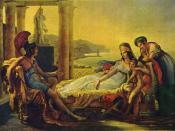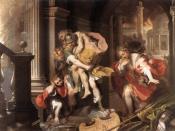Virgil portrays Aeneas as a Trojan hero, a warrior who will lead his people to safety, found a new Trojan state, and establish order in his and his countryman's lives. Aeneas is the embodiment of Roman virtues: He is the dutiful servant of fate and of the gods, he is an exemplary leader of his people, and he is a devoted father and son. I disagree with the question because Aeneas has demonstrated appropriate pietas of devotion to one's family, country, and mission. Aeneas's character possesses human qualities as well. He is presented as a flawed mortal man, a man with feelings. Aeneas easily fulfills the patriotic role as leader of his people. He provides for his people when they find a safe harbor on the North African coast of Libya by making sure they have food to eat, and he comforts and motivates them by reminding them of their destined homeland.
In Book III, Aeneas becomes more comfortable with his role as leader. When he is in Thrace, Aeneas tells, "I plotted out / on that curved shore the walls of a colony/ Though fate opposed it and I devised the name / Aeneadae for the people, my own." By dividing the land into homesteads, Aeneas attempts to bring order and security to his people. Even though Polydorus advises Aeneas to leave Thrace, he first consults other leaders of the people before making a decision; he does not abuse his power.
Aeneas's people never question his judgment; they consistently acquiesce to his decisions, for example, during the athletic games when Aeneas declares Euryalus the winner of the foot race in spite of Salius being tripped by Nisus. Aeneas gives gifts to all the participants and exhibits his confidence as a leader by saying all the right things at...


